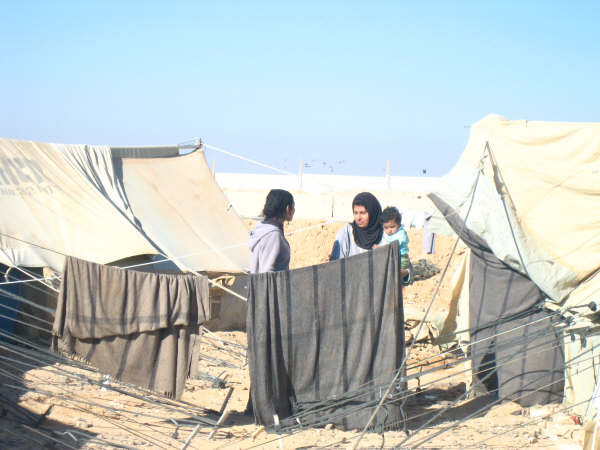March 12, 2008
In 2006, as Iraq descended into new depths of civil conflict, 350 Palestinian refugees were driven out of Baghdad by targeted violence. They arrived in the desert no-man's-land between the Iraqi and the Syrian border crossings at Al-Tanf. Due to their concerns over the arrival of an estimated 1.6 million Iraqi refugees adding to the number of Palestinian refugees already in the country, the Syrian authorities denied the Palestinians access into Syria, also preventing any more Palestinians arriving into the no-man's land.
The worsening violence in Iraq, however, saw the continuing arrival of Palestinian refugees at the border. An estimated 1,740 refugees are now stuck in Al-Waleed camp on the Iraqi side. In addition, towards the end of 2007 about 350 Palestinians who previously entered Syria with Iraqi passports were relocated to Al-Tanf camp. The number of refugees in al-Tanf has now increased to an estimated 720 refugees, 500 of whom are women and children.
For many of the refugees, the trigger for their attempt to leave Iraq was the extreme violence they had suffered. Bereft of a militia to protect their minority status, middle class Palestinians in particular have been frequent targets of brutal kidnapping and ransom attempts. Forty-year old mother of three Tisar Abdel Fadi left Baghdad for Al-Tanf following her husband's kidnapping from a hospital. He was subsequently tortured and killed.
For these vulnerable refugees, it was a case of leaving the frying pan of Baghdad only to find the fire of the barren desert camps. The refugees in the Al-Waleed camp in particular are subject to fluctuating politics of local and regional sheikhs in the lawless Anbar province. These local authorities try to secure a share of the aid business and intervene according to their own interests. This makes the work of the international aid organisations extremely difficult as they are regularly hindered in carrying out their jobs effectively. Security is so poor that overnight visits are not possible. Other players interfering in the running of the camp include the border police, local police and the Iraqi army.
Both camps are characterised by tented accommodation due to the fear that more solid structures would encourage permanent settlement in what constitutes the most peripheral and unforgiving of locations. Given the harsh weather conditions -- the freezing cold in winter, the unbearable desert heat in summer -- and the regular threats from fires, snakes and scorpions, long-term dwelling in a tented settlement is simply not a viable solution.
In Al-Waleed, the refugees have installed toilets in their tents, but the ground does not allow for the absorption of the waste water. This forces the sewage to run openly through the camp, leading to a higher incidence of disease and infections as children play between the tents. The medical requirements of these refugees are numerous; they include the need for an additional female doctor, as well as more frequent visits from the gynaecologist. There is also a need for a psychologist, trauma counsellors, a dentist, nurses and a proper medical health centre in the camp.
In addition, the only activities available in the camp are basic schooling for the children and embroidery work for women; hence, the refugees are condemned to sit around, watch TV and do nothing for most of their time.
MAP took an Iraqi doctor and refugee in Damascus, to visit the camp. The doctor noted that the most serious medical conditions were clearly linked to the negative effects on the mental health of the refugees caused by a pervasive sense of the hopelessness of their situation and the difficulties of the environment.
Indeed the main problems faced by the Palestinian refugees currently living along the border are the unbearable physical conditions and their uncertain future. There is an urgent and seldom recognised need for these refugees to be resettled as soon as possible. It is also their explicit wish not to be brought to any other Arab country but to another country which gives them permanent living status.
The severity of the humanitarian status of the refugees in these camps led the UN to deploy their high-profile Goodwill Ambassador Angelina Jolie in August 2007. After visiting Al-Waleed, Miss Jolie told the press that, "it is absolutely essential that the ongoing debate about Iraq's future includes plans for addressing the enormous humanitarian consequences these people face." Yet almost half a year on and little has changed, the situation remains as desperate as ever for these Palestinians stuck in one of the world's most barren no-mans-land.
|

0 comentarios